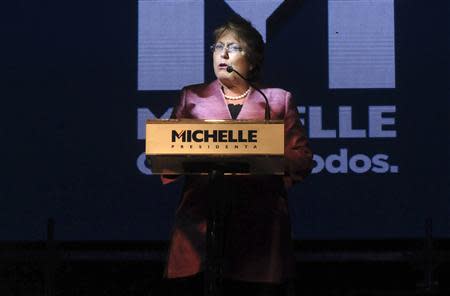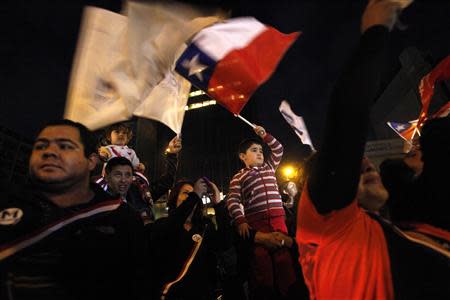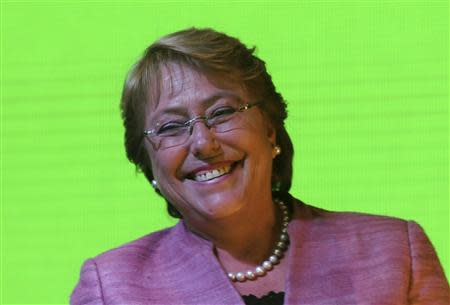Bachelet triumphs in Chile election but faces runoff
By Rosalba O'Brien and Anthony Esposito SANTIAGO (Reuters) - Leftist candidate Michelle Bachelet was the clear winner in Chile's presidential election on Sunday, although she will have to wait until a second-round runoff next month to seal her victory. With nine candidates running, the vote was fractured and Bachelet, seeking her second term as president, fell just short of the 50 percent she needed for an outright first-round victory. Bachelet, who led Chile between 2006 and 2010 as its first female president, clinched just under 47 percent of the vote. Runner-up Evelyn Matthei of the ruling right-wing coalition was second with 25 percent. The two will now go head-to-head in a runoff on December 15. Bachelet is promising an ambitious program of tax and education reform to tackle inequality in the top copper exporting country, while Matthei has pledged to largely continue the business-friendly policies of the current administration of President Sebastian Pinera. Bachelet's eventual victory looks assured, as most supporters of the largely anti-establishment minor candidates - who took around 28 percent of the vote between them - will likely throw her their support in the second round, or else abstain. A physician by training and moderate socialist by conviction, Bachelet has promised 50 reforms in her first 100 days if she returns to power. Her flagship policy is an increase in corporate taxes to 25 percent from 20 percent to pay for education reforms that include a gradual move to free higher education. She also wants to rewrite the dictatorship-era constitution. "I voted for Bachelet," said pensioner Fernando Forttes as he left the polling station on Sunday. "I hope the model will change ... with more social justice and through that more opportunities. Her program is a European social democrat program. It's nothing from another world. Here there will be no revolution." Bachelet also needs control of Congress to push through the changes she wants. Results from Sunday's congressional elections were not yet complete, although early indications were that Bachelet's bloc will have the simple majority it needs to carry out tax reform. However, under the Chilean system, the governing coalition needs more than a simple majority to pass some kinds of legislation, making it easier for the opposition to block key reforms. For instance, she will need four-sevenths of parliament to pass education reform. That was still too close to call on Sunday evening. It looked unlikely she would get the even higher majorities she needs for electoral reform or to change the constitution. It was political stalemate - combined with her own inexperience - that stymied her ability to push through the reforms she wanted in her first administration. Sunday's result will be "very disappointing" for Bachelet, who had campaigned hard to get the strong mandate that an outright win would have implied and the backing in Congress to see it through, said author and political science professor Peter Siavelis. "Even though Bachelet may be the winner tonight, she is not in an enviable position," he said. Bachelet smiled as she spoke to supporters at her temporary headquarters in central Santiago on Sunday night. "The country has mostly voted for the proposal that we have made for Chile, so that Chile will be once and for all the modern and fair country that we want," she said to cheers. "We won tonight and we will work to win by an ample margin in December." ECHOES OF PAST Chile is an economic success story in Latin America but the showdown between Bachelet and Matthei has revived memories of darker days when socialist president Salvador Allende was overthrown by General Augusto Pinochet in a 1973 coup that ushered in 17 years of dictatorship. Bachelet and her father were victims of torture during the Pinochet years, while Matthei's father was a general in the dictator's junta. The two men had become friends when they were posted to the same airforce base in the 1950s, and where their daughters played together as children. Matthei supported Pinochet in the 1988 plebiscite on his rule, and the 40th anniversary of the coup in September left her facing awkward questions just as the presidential campaign was getting going. She was also held back by dissatisfaction with Pinera's rule. Despite healthy economic growth and plaudits for its fiscal responsibility, the government is seen as out of touch and slow to respond to demands for change. The sometimes-violent student demonstrations demanding free education have not helped the government's image. Assuming she wins in December, Bachelet will hope to have gained some breathing space by bringing the Communist Party into her Nueva Mayoria coalition. The party has strong links with the student protesters, and some former student leaders - including Camila Vallejo, the face of the movement - look set to enter the lower house after Sunday's vote. But they are likely to prove prickly allies, and their support will not be unconditional if Bachelet faces a stalemate in Congress or has to water down her reforms to get them through, once she takes the reins in March 2014. (This stolry has been corrected to fix the date of plebiscite in paragraph 24 to 1988 from 1998) (Editing by Kieran Murray and Jackie Frank)



